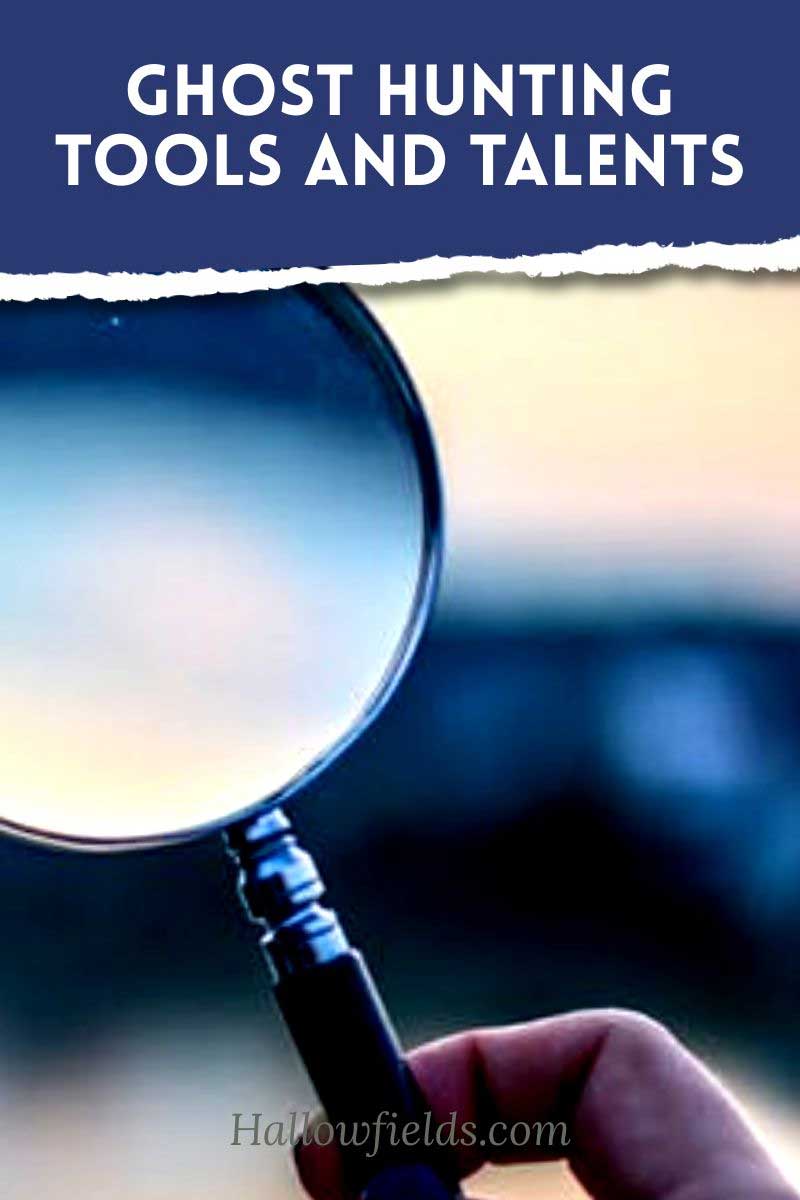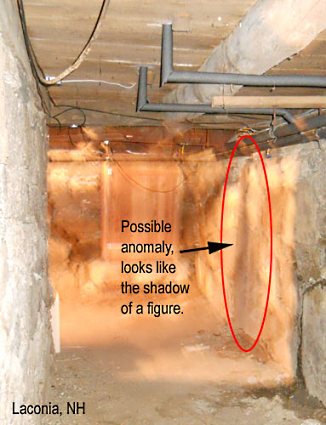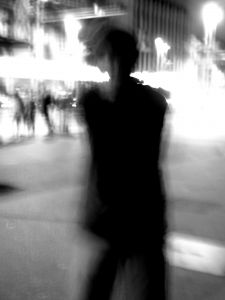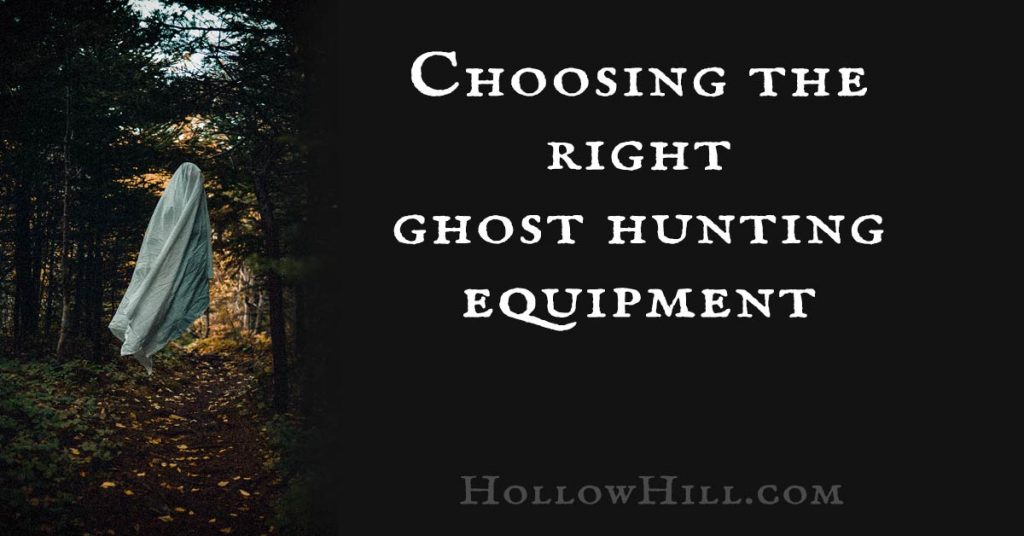As an Amazon Associate I earn from qualifying purchases. Click for details.
 This is my third lesson in the Ghost Hunting for Beginners course.
This is my third lesson in the Ghost Hunting for Beginners course.
So far, you’ve thought about why you’re interested in ghost hunting, and set some immediate goals and limits.
You’ve also tried a brief ghost hunt as a “dress rehearsal.”
That helped you preview what works well (and doesn’t) with your ghost hunting goals.
In an upcoming lesson, you’ll plan – and then go on – a more serious investigation.
Meanwhile, let’s talk about two things.
The first is ghost hunting equipment, since TV shows make it seem like tools are essential.
(Are they, really? It depends on your research focus.)
The other topic we’ll discuss is: your talents. Those can include things you’re naturally good at, especially observation skills.
And let’s not forget useful things you’ve learned from education, experience, or your career.
They can counter-balance (or a supplement) actual ghost hunting tools.
Ghost hunting equipment – do you need it?
If there’s just one thing I’d love students to learn from this course, it’s that – for a memorable ghost investigation at a truly haunted site – you don’t need anything more than your five (or six) senses.
Sure, it’s exciting to see an EMF meter light up for no reason. Or to hear some fleeting word or phrase from a ghost box.
But the moments that make the most lasting impression are those where you hear, see, sense, or feel something and you know it had to be a ghost.
That subjective experience can change your life as well as your belief in ghosts and haunted places.
Do I use ghost hunting tools…?
Of course, but I don’t investigate haunted sites to see lights flash on ghost hunting equipment.
And though I’m still startled when I hear weird noises from some device, it doesn’t impress me as it once did.
I believe most people become ghost hunters for the experience… the memorable moments when they’re almost certain they’ve encountered a ghost.
Research tools can be helpful, but they only confirm that something odd is going on.
For many people – including me – they’re not reliable stand-alone evidence of paranormal activity.
Further analysis – including debunking – is needed.
Popular investigation tools
Every month or two, new ghost hunting equipment becomes available. Some are major improvements on past tools. Others are just flashier, more gimmick-y devices.
These are some of the most popular tools:
- Regular cameras and video equipment. Your phone is all you need to get started.
- EMF meters. Even the “as seen on TV” ones can work well… but read the reviews (and be skeptical of five-star reviews).
- EVP recording devices. The voice recorder on your phone is probably good enough, for now.
- Specialized flashlights.
- Motion and vibration detectors. (So far, I’m not impressed.)
- Real-time communication devices, such as the spirit box, Ovilus, Puck, Frank’s Box, and so on.
- Specialized cameras designed to show energy forms as well as orbs and other anomalies. (If you want to understand those stick figures seen on TV shows, Polygon explained the basics, and the pre-assembled equipment is available from several resources.)
- Yes/no (binary) tools such as purpose-built devices, and also loosened flashlights.
- Ghost hunting apps for phones and handheld devices. (Yes, some ghost hunting phone apps seem to work well.)
- NOTE: Dowsing rods, pendulums, and divination tools – including Ouija boards – are not recommended.

It’s exciting to confirm your perceptions with hard evidence.
It’s thrilling when an EMF spike occurs seconds after you felt a chill.
If a photo shows a strange shadow, it could be the same figure others have seen at that location.
Having a photo (or video) to show them? That makes the anomaly seem more believable. It’s a confirmation that, no, you weren’t “just imagining it.”
Also, a voice from a spirit box can be startling, especially when a word or phrase fits the haunting.
When ghost hunting turns scary, your equipment can serve a second purpose. That is, it can keep you from panicking.
Proof, distraction, or both?
Putting your attention on something very real and physical can be a relief. It’s a temporary break.
Any investigation can seem overwhelming.
You’ll encounter things you can’t explain… phenomena and feelings you can’t control.
It can seem scary.
That’s when it’s comforting to step back into the “real” world of cameras and audio equipment, ghost apps, and EMF devices.
That sense of control can be essential. After all, if your ghost hunting tools seem to go haywire, you can turn them off.
Anything that shifts your focus away from your fears can provide a healthy break.
BUT…
You may also be at risk
Ghosts can be very different from what you expected. It’s normal to feel vulnerable.
It’s okay to take a brief “time out.”
It may be okay to simply focus on your ghost hunting equipment.
Check your readings for a few minutes.
But then get back to being alert. Engage all of your senses again, even if you’re frightened. (However, if you’re genuinely terrified, leave the site immediately. I mean it.)
Ghost hunting tools can be a problem when:
- You rely on them too much. If you’re wholly focused on your equipment, how is that different from watching ghost hunting on TV? (However, if your goal was to see ghost hunting equipment working in real life, that may be fine.)
- They distract you from genuine risks. Never ignore a “gut feeling” that warns you of danger.
- Tools interfere with research. For example, when your Ovilus or spirit box keeps talking, but someone nearby is recording EVP.
- When ghosts (or other entities) use those tools to frighten you.
Keep that last point in mind. Many people believe that ghosts can interact with EMF meters, real-time communication tools, etc.
If that’s true, malicious spirits can also use your tools to scare you.
The most obvious danger is divination tools, when the ghost hunter allows a spirit to move or speak “through” them. That’s why I no longer recommend dowsing rods, except to rule out underground water (a source of infrasound). Also avoid Ouija boards (or “spirit boards” that are used the same way), some pendulums, automatic writing, channeling, and so on.
When a ghost tried to scare us
During one investigation in Salem, Massachusetts, several team members experienced waves of terror. At that point, I worried about their emotional well-being.
Next, another team member decided to act-out the victim’s abuse posture. (That’s never a good idea.)
Then, the Ovilus in my hand said my name, Fiona, aloud. That was truly odd. The name “Fiona” was not in the Ovilus word list.
Something was trying to scare us in very personal ways.
Right away, I turned off the Ovilus. We rushed through our investigation in that part of the site and moved to another area.
The rest of the site was haunted, but not in frightening ways.
Be prepared… just in case
 It’s very unusual for a spirit to use your equipment to frighten you.
It’s very unusual for a spirit to use your equipment to frighten you.
Out of hundreds of investigations, I’ve witnessed that fewer than a dozen times.
If a malicious entity or angry ghost targets you, get out of that area.
Pause for a minute or two.
Recover.
Then decide the safest course of action. When in doubt, leave the site altogether.
Whatever you decide, be sure to warn other teams about your experience.
Never put yourself (or others) at risk when you’re dealing with something you cannot see.
Ghost hunting tools and equipment – personal choices
When professional ghost hunters gather, we often discuss ghost hunting tools. Opinions vary, wildly.
I believe that some ghost hunters “tune in” to certain tools. They may see limited results with other kinds of equipment.
Few investigators are adept (or skilled) in every research area.
One ghost hunter may take great photos, but get nothing in EVP recordings.
Or, dowsing rods may respond, but not a pendulum.
I’ve seen an Ovilus talk almost non-stop to one person, and then go totally silent in the hands of someone else. And then resume talking when the Ovilus was returned to the first person.
Nobody knows why this happens.
And currently, I do not recommend using any divinatory tools. I’m not sure what’s seemed so menacing in recent years, but something has changed.
Basically, any ghost hunting equipment that tempts you to “open up” to spirits, personally, even allowing them to speak through you… it’s too risky. My past, related recommendations should be ignored.
Ghost hunting equipment can work for one person… but not another.
Someone else’s natural (or developed) knack for, say, EVP doesn’t mean you lack talent.
Every ghost hunter is unique.
Spirit contact may vary with different people and types of equipment. It may change with time, but also from one location to another.
With more experience, you’ll discover your natural aptitudes. (Me…? I’ve always been good with ghost photography, and not-so-great at EVP.)
Always remember, ghost hunting isn’t a competition. There is no trophy for Best Ghost Hunter, Ever.
First, discover your ghost hunting talents
Every ghost hunter is unique. Start with an open mind. You may have talents you didn’t expect.
- Some ghost hunters notice flickering lights and shadows. Others rarely see them.
- Many researchers sense changes in temperature – especially cold spots. Others are more sensitive to hot spots, which can be far more dangerous.
- Some investigators are receptive to sounds while others aren’t.
- Some consistently photograph anomalies, and others don’t.
- And so on.
Before you invest in ANY ghost hunting equipment, get a sense of how ghosts contact you.
The most important lesson I can share with you is this: Learn to use your five (or six) senses.
Also, make sure you’re going to continue in ghost hunting. It’d be silly to buy a three-figure EVP recorder or a four-figure thermal camera and – a month or two later – realize you don’t really enjoy visiting haunted places.
In fact, it’s best to explore your options as much as you can before buying anything.
I rarely rely on ghost hunting equipment.
At least 90% of my work as a ghost hunter involves no equipment at all.
- I sense temperature with my hands.
- I pause and listen carefully for noises.
- I note any visual anomalies, and then inspect that location more closely.
- I take note of any odd, fleeting odors, especially cigar or pipe smoke, or old-school perfumes.
And so on.
When I do use ghost hunting equipment, it’s usually just to baseline the site before the investigation.
That is, I check it for wonky wiring, drafts, odd noises, occasional flashes of light from passing cars, and so on. I want to be sure we’re not attributing a building flaw to ghosts. (You might be surprised to learn how many “haunted” basements are actually caused by bad or unshielded wiring. An EMF detector will reveal that.)
Every investigator has different talents. Time – and multiple experiences at haunted sites – will help you understand what your strongest talents are.
I suggest going on at least four or five serious, multi-hour investigations before investing in ghost hunting tools.

Test-drive ghost hunting equipment.
No matter what I say about your five (or six) senses, I know that many aspiring ghost hunters want to own some ghost hunting tools.
Before spending a cent, please borrow ghost hunting equipment from other researchers. See what works well for you.
Yes, some researchers are unwilling to have anyone else touch their ghost hunting gear. They’re concerned that energy signatures linger after contact with another person.
I respect that. It may seem like the spiritual equivalent of someone borrowing your sweater and stretching it out-of-shape, so it never really fits right again.
But some people won’t mind showing you how certain devices work, and loaning them to you for ten or twenty minutes, or even a full investigation.
Some ghost hunting teams – and a few ghost tours – have ghost hunting equipment for this purpose: So they can loan it to visitors and potential future associates.
Remember that ghost hunting equipment can stop working.
In extremely haunted locations, all electrical equipment – including phones – can quit working. Some believe that’s due to the supernatural EMF levels, and that might indicate ghostly activity.
Here’s what to do if that happens to you:
Which ghost hunting tools are best?
First, test the kind of equipment that interests you the most. Always start with the simplest tools. Dowsing rods are simple. An Ovilus can seem very complex. (During most investigations with my Ovilus III, I use just two tools on it. And usually just one.)
Remember that you can use your phone as a ghost hunting toolbox. Sometimes, phones – even older phones – can perform as well as specialized equipment.
Even better, you’re already comfortable with your phone. With a shorter learning curve, you might get impressive results, sooner.
Using your phone as a ghost hunting equipment.
-
Ghost photos
Flash cameras on recent phones can be far better than free-standing cameras, even expensive ones.
Most ghost photos are taken with a flash camera. You may also need a steady hand, depending on how dark the site is and if you can adjust the ISO on your phone/camera.
(A tripod is too much trouble to set up and adjust. Exceptions are: if you’re recording video for an extended time, or leaving your camera set up with a motion detector to trigger it.)
However, while fog, rain, pollen, and dust are among the easy explanations for many “ghost orbs,” remember one big question: Since most sites have natural-occurring pollen or dust (etc.), why don’t we see ghost orbs in far more everyday photos?
-
EVP recordings
You can probably record voices (your own and ghosts’) with your phone. At home, download it to your computer and process it with EVP software. (Usually, you can find free software. Search online for “evp filtering software,” see what others recommend, and try a few. Often, regular audio software – like Audacity – can be enough.)
-
Ghost apps
I used to think ghost apps were fake. Some claim to detect EMF. Others create voices from what they claim are “ghost messages.”
And so on.
I changed my mind when a ghost app worked better than I’d ever expected.
A couple of years later, a “ghost radar” app on Sean Paradis’ phone surprised me when it confirmed what a psychic (Lesley Marden) detected and what dowsing rods indicated, simultaneously.
There was NO reasonable explanation for that. It was far too coincidental.
So, whether they’re free or cost a small amount, some of those simple apps actually work.
…Or perhaps they only work in the hands of gifted investigators. I’m not sure.
After you’ve tried a few ghost hunting tools, see what appeals to you the most.
Also consider what seems to work well for you.
For example, does your phone record any EVP (ghostly voices)? If not, don’t waste your money on an expensive digital voice recorder and software. (You may want to try a cheap voice recorder first, if you’re not sure.)
Let these points – and your budget – determine which ghost hunting tools you want to use, if any.
Keep your goals in mind, and your limits. Unless your goals include doing “exactly what [some famous ghost hunter] does on TV,” start with as little equipment as you can.
Your own senses may impress you far more than any flashing lights or weird recordings.
For more about this topic, see my article, Basic Tools Every Ghost Hunter Must Have.
Next Lesson: A Thorough Ghost Investigation
Share your thoughts!
After considering the kinds of ghost hunting equipment you may want to try in the future, did you have any questions or insights?
Also, what talents (or even “superpowers”) might you have as a ghost hunter?
Leave a comment here. I read all of them. Also, other ghost hunters (and students) may benefit from – and appreciate – your insights.
Upon approval, your comments will appear below.
